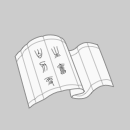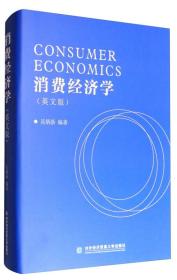
消费经济学(英文版)
正版图书带塑封 14点之前订单当日发货 91054925462125412357
¥ 11.97 1.4折 ¥ 88 九五品
仅1件
天津宝坻
认证卖家担保交易快速发货售后保障
作者吴炳新 著
出版社对外经济贸易大学出版社
出版时间2017-07
版次1
装帧精装
货号91054925462125412357
上书时间2024-12-17
- 最新上架
商品详情
- 品相描述:九五品
图书标准信息
- 作者 吴炳新 著
- 出版社 对外经济贸易大学出版社
- 出版时间 2017-07
- 版次 1
- ISBN 9787566317902
- 定价 88.00元
- 装帧 精装
- 开本 16开
- 纸张 胶版纸
- 页数 445页
- 字数 670千字
- 正文语种 英语
- 【内容简介】
-
Mr. Wu Bingxin came to his 78th birthday this year. At such a senior stage of life, Mr. Wu has just completed his writing and editing of his masterpiece, Consumption Economics. It was a great honor of me to have read it in advance which has brought about to me a myriad of thoughts.
Consumer Economics is a newly emerging subject, which is the economics taking human consumption activity and its laws of motion as the researching objects. Mr. Wu Bingxin, based on his consumption comprehensive theoretical system, inherited and developed its essence, and brought about new exploration and deepening to his theoretical system on this basis. Under the direction of him, a new textbook, which is of typical characteristics of the time and high level in academy, has been written and edited with the efforts of and cooperation among experts and professors from different universities and research institutions. Their excellent job has provided an excellent textbook for the teaching of consumer economics in colleges, which is indeed beyond my expectation. Mr. Wu and I have been friends for decades. Around 20 years ago when I was the vice president of Nanjing University, Mr. Wu gave great financial support to the education and scientific research of Nanjing University. Nanjing University played a leading role in the achievements in scientific research among all the universities in China at that time, which shall partly thanks to him.
Mr. Wu Bingxin was born in Jiaodong Peninsula. He witnessed the death of his father at his 5 and the death of his mother at his 6, and began to be engaged in farming from 7 years old on. At such a young age, he showed the eagerness of learning. Since his family could not afford it, he borrowed books from his neighbors and studied hard in his village. Thus, he learned clearly the life direction guided by Chinese culture, and he was determined to study and work for the nation on that basis. At his 19, as a response to the call of the Party, he participated in the construction of Baotou steel base, and was then transferred to Inner Mongolia Mining Bureau and Baotou Valve Factory and other units, while he has experienced a series of positions including accounting, section chief, labor union chairman, Party branch secretary and president of technical school and so on. He has won a number of honors and has been awarded for times.
Mr. Wu retired from the state-owned enterprise in 1980s, which indicated a retirement without release. With such a great spirit of that "as Heaven's movement is ever vigorous, so must a gentleman ceaselessly strive along", he began to struggle for his own business, which witnessed the start in Baotou, the passing-by in Huainan and the final establishment in Jinan. Sanzhu Group, created by him, has its business scope in industries including health care products, medicine, medical equipment, ecological cosmetics and others, its fixed assets being mounted up to billions yuan, its highest annual sales income being 8.4 billion yuan, and its highest annual tax amount being 820 million. Sanzhu Group was the largest private enterprise in China at that time, and was named as an "economic miracle" by economists in China and abroad. In 1995, Sanzhu Group was assigned by the State Science and Technology Commission and Shandong Science and Technology Commission as a high-tech enterprise. In 1997, it was assigned by the State Science and Technology Commission as the key high-tech enterprise of national Torch Plan. In the same year, it was awarded the Five-Star Diamond prize by American Association for Quality of Service Science, while in China, Mr. Wu as
awarded "hero of reform and opening up". The achievements of Sanzhu Group was praised for several times by Party and state leaders.
Mr. Wu was well known as a successful entrepreneur. In deed, in addition to an entrepreneur, he is a scholar of hard working at the same time. In his life, he worked in state-owned enterprises for more than 30 years to have cultivated the rich practice and experience of the planned economy era. After the reform and opening up, he cultivated another-30-year practice and experience of private economy. On that basis, his writings and works are not only full and accurate but also pretty practical. Now he has been invited by a number of universities and colleges and research institutions in China and abroad as the guest professor or specially invited researcher. For years, he has never stopped writing to have mounted his articles up to millions of words. At the beginning of the reform and opening up, he wrote a letter to the Sate Council to explain his strategy of the country's development, which was of sincerity and eagerness in government affair discussion, and was praised by the Sate Council leaders. - 【作者简介】
- 吴炳新,1938年出生于山东威海,美国体斯敦入学人义博士,三株集团董事长,对外经济贸易入学中国消费经济研究院院长、教授、博士生导师,荚国休斯敦入学吴冯国际工商教育中心常驻总干事,中央财经大学、山东大学、国家行政学院兼职教授,济南大学客座教授,山东社会科学院特约研究员。建立了消费综合理论系统,著作有《吴炳新义集》《吴炳新义选》《消费论》《消费通论》《消费与篱理》(Consumption and Management)《领导管理科学新论》《消费经济学》。
- 【目录】
-
Chapter 1 Introduction
Section 1 The Meaning and Classification of Human Consumption
Section 2 The Theoretical Framework and the Object of Study in Economics ofConsumption
Section 3Application of Consumer Economics in China
Section 4 China Starts to Enter the Consumer Economy Era
Section 5 Research Methods of Consumer Economics
Chapter 2 Consumer Economic History and the Evolution of Consumption Theory
Section 1 Human Consumption Law
Section 2 Consumption and Population and Land
Section 3 Chinese and Western Consumption Theory
Section 4 Consumption Theory in Economic Sociology
Section 5 Marx Consumption Theory
Section 6 Deng Xiaopings Consumption Idea
Chapter 3 Consumption Chain
Section 1 Consumption and Consumption Chain
Section 2 Micro Consumption Chain
Section 3 Macro Consumption Chain
Section 4 Consumption Chain and Marketing Method
Section 5 Sustainable Consumption
Chapter 4 Productivity in Consumer Society
Section 1 Constitution of Productivity in Consumer Society
Section 2 Productivity in Consumer Society and Productive Relations
Section 3 Classification of Productivity in Consumer Society
Section 4 Element Analysis of the Narrow Sense of Productivity in Consumer Society
Section 5 Element Analysis of the Broad Sense of Productivity in Consumer Society
Chapter 5 Consumption Need and Consumption Demand
Section 1 Meaning and Characteristic of Consumption Need
Section 2 Development Trend of Consumption Need
Section 3 Meaning and Category of Consumption Demand
Section 4 Relation between and Function of Consumption Demand and Economic Growth
Section 5 Influence Factor and Change Trend of Consumption Demand
Chapter 6 Consumption Structure
Section 1 Meaning and Influence Factors of Consumption Structure
Section 2 Change and Tendency of Consumption Structure in China
Section 3 Consumption Structure Rationalization
Section 4 Consumption Structure and Industrial Structure
Chapter 7 Consumption Pattern
Section 1 Meaning and Influence Factors of Consumption Patterns
Section 2 Change and Development Tendency of Consumption Patterns
Section 3 Individual Living Consumption and Group Living Consumption
Section 4 Non-market Living Consumption and Market Living Consumption
Section 5 Establishing Civilized Healthy and Scientific Consumption Pattern
Chapter 8 Consumer Market
Section 1 Meaning and Feature of Consumer Market
Section 2 Position and Type of Consumer Market
Section 3 Consumes Purchasing Behavior Rule
Section 4 Development Tendency of Chinese Consumer Market
Section 5 Development Prospect of Chinese Consumer Market
Chapter 9 Consumption Environment
Section 1 Basic Contents of Consumption Environment
Section 2 Significance of Optimizing Consumption Environment
Section 3 Consumption Environment and Sustainable Development
Section 4 Optimization of Consumption Environment
……
Chapter 10 Consumption Philosophy
Chapter 11 Macro Regulation System of Consumer Market
Chapter 12 Consumer Rights and Interests and Consumer Education
Chapter 13 Service Consumption
Chapter 14 Spiritual and Cultural Consumption
Chapter 15 Information Consumption
Chapter 16 Network Consumption
Chapter 17 Consumption and Enterprise Management
Chapter 18 Financial Management and Macro-control of Family Consumption
Chapter 19 Consumption Is the Driving Force of Social Civilization Progress
References
Postscript
点击展开
点击收起
相关推荐
— 没有更多了 —
















以下为对购买帮助不大的评价